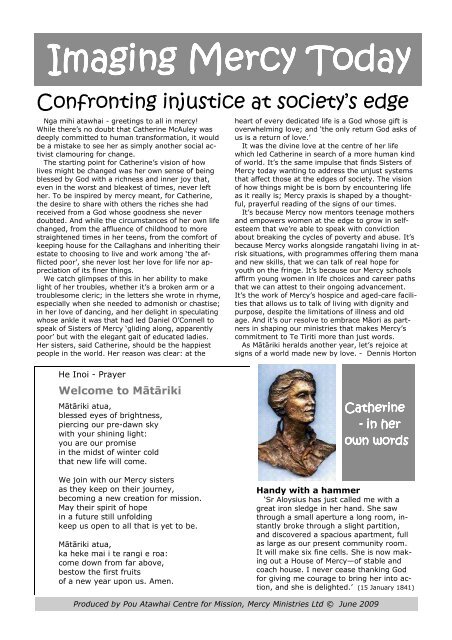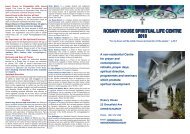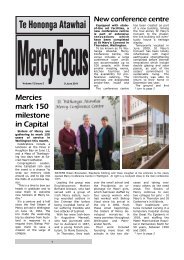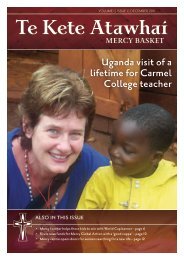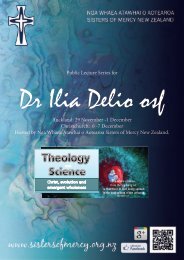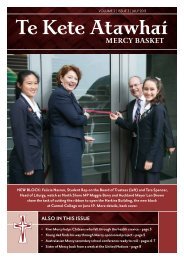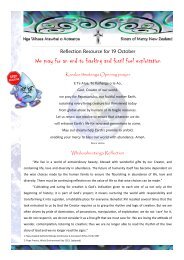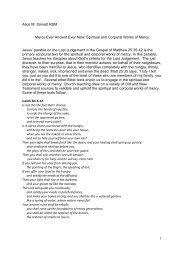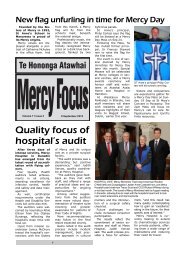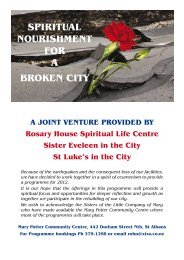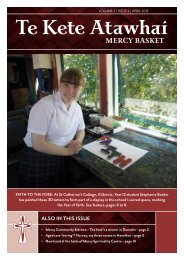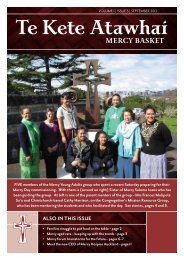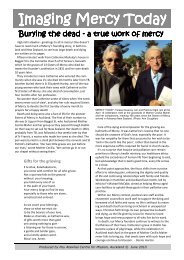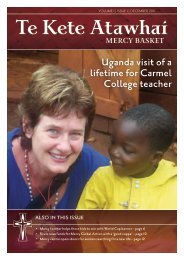Mercy Today 2 - 5 - Sisters of Mercy of Aotearoa New Zealand
Mercy Today 2 - 5 - Sisters of Mercy of Aotearoa New Zealand
Mercy Today 2 - 5 - Sisters of Mercy of Aotearoa New Zealand
You also want an ePaper? Increase the reach of your titles
YUMPU automatically turns print PDFs into web optimized ePapers that Google loves.
Imaging <strong>Mercy</strong> <strong>Today</strong><br />
Confronting injustice at society’s edge<br />
Nga mihi atawhai - greetings to all in mercy!<br />
While there’s no doubt that Catherine McAuley was<br />
deeply committed to human transformation, it would<br />
be a mistake to see her as simply another social activist<br />
clamouring for change.<br />
The starting point for Catherine’s vision <strong>of</strong> how<br />
lives might be changed was her own sense <strong>of</strong> being<br />
blessed by God with a richness and inner joy that,<br />
even in the worst and bleakest <strong>of</strong> times, never left<br />
her. To be inspired by mercy meant, for Catherine,<br />
the desire to share with others the riches she had<br />
received from a God whose goodness she never<br />
doubted. And while the circumstances <strong>of</strong> her own life<br />
changed, from the affluence <strong>of</strong> childhood to more<br />
straightened times in her teens, from the comfort <strong>of</strong><br />
keeping house for the Callaghans and inheriting their<br />
estate to choosing to live and work among ‘the afflicted<br />
poor’, she never lost her love for life nor appreciation<br />
<strong>of</strong> its finer things.<br />
We catch glimpses <strong>of</strong> this in her ability to make<br />
light <strong>of</strong> her troubles, whether it’s a broken arm or a<br />
troublesome cleric; in the letters she wrote in rhyme,<br />
especially when she needed to admonish or chastise;<br />
in her love <strong>of</strong> dancing, and her delight in speculating<br />
whose ankle it was that had led Daniel O’Connell to<br />
speak <strong>of</strong> <strong>Sisters</strong> <strong>of</strong> <strong>Mercy</strong> ‘gliding along, apparently<br />
poor’ but with the elegant gait <strong>of</strong> educated ladies.<br />
Her sisters, said Catherine, should be the happiest<br />
people in the world. Her reason was clear: at the<br />
heart <strong>of</strong> every dedicated life is a God whose gift is<br />
overwhelming love; and ‘the only return God asks <strong>of</strong><br />
us is a return <strong>of</strong> love.’<br />
It was the divine love at the centre <strong>of</strong> her life<br />
which led Catherine in search <strong>of</strong> a more human kind<br />
<strong>of</strong> world. It’s the same impulse that finds <strong>Sisters</strong> <strong>of</strong><br />
<strong>Mercy</strong> today wanting to address the unjust systems<br />
that affect those at the edges <strong>of</strong> society. The vision<br />
<strong>of</strong> how things might be is born by encountering life<br />
as it really is; <strong>Mercy</strong> praxis is shaped by a thoughtful,<br />
prayerful reading <strong>of</strong> the signs <strong>of</strong> our times.<br />
It’s because <strong>Mercy</strong> now mentors teenage mothers<br />
and empowers women at the edge to grow in selfesteem<br />
that we’re able to speak with conviction<br />
about breaking the cycles <strong>of</strong> poverty and abuse. It’s<br />
because <strong>Mercy</strong> works alongside rangatahi living in atrisk<br />
situations, with programmes <strong>of</strong>fering them mana<br />
and new skills, that we can talk <strong>of</strong> real hope for<br />
youth on the fringe. It’s because our <strong>Mercy</strong> schools<br />
affirm young women in life choices and career paths<br />
that we can attest to their ongoing advancement.<br />
It’s the work <strong>of</strong> <strong>Mercy</strong>’s hospice and aged-care facilities<br />
that allows us to talk <strong>of</strong> living with dignity and<br />
purpose, despite the limitations <strong>of</strong> illness and old<br />
age. And it’s our resolve to embrace Māori as partners<br />
in shaping our ministries that makes <strong>Mercy</strong>’s<br />
commitment to Te Tiriti more than just words.<br />
As Mātāriki heralds another year, let’s rejoice at<br />
signs <strong>of</strong> a world made new by love. - Dennis Horton<br />
He Inoi - Prayer<br />
Welcome to Mātāriki<br />
Mātāriki atua,<br />
blessed eyes <strong>of</strong> brightness,<br />
piercing our pre-dawn sky<br />
with your shining light:<br />
you are our promise<br />
in the midst <strong>of</strong> winter cold<br />
that new life will come.<br />
We join with our <strong>Mercy</strong> sisters<br />
as they keep on their journey,<br />
becoming a new creation for mission.<br />
May their spirit <strong>of</strong> hope<br />
in a future still unfolding<br />
keep us open to all that is yet to be.<br />
Mātāriki atua,<br />
ka heke mai i te rangi e roa:<br />
come down from far above,<br />
bestow the first fruits<br />
<strong>of</strong> a new year upon us. Amen.<br />
Catherine<br />
- in her<br />
own words<br />
Handy with a hammer<br />
‘Sr Aloysius has just called me with a<br />
great iron sledge in her hand. She saw<br />
through a small aperture a long room, instantly<br />
broke through a slight partition,<br />
and discovered a spacious apartment, full<br />
as large as our present community room.<br />
It will make six fine cells. She is now making<br />
out a House <strong>of</strong> <strong>Mercy</strong>—<strong>of</strong> stable and<br />
coach house. I never cease thanking God<br />
for giving me courage to bring her into action,<br />
and she is delighted.’ (15 January 1841)<br />
Produced by Pou Atawhai Centre for Mission, <strong>Mercy</strong> Ministries Ltd © June 2009
The difference <strong>Mercy</strong> makes<br />
Seven years ago, <strong>Mercy</strong><br />
entered the fast developing<br />
rohe area <strong>of</strong> Waitakere City.<br />
It was the call or cry <strong>of</strong> our<br />
young people and children - te<br />
tangi me te karanga o nga rangatahi<br />
me nga mokopuna - that<br />
drew <strong>Mercy</strong> here. That same cry<br />
is still the heart-beat <strong>of</strong> our organisation<br />
today.<br />
What a beginning to a wonderful<br />
relationship with the people<br />
<strong>of</strong> the land that links us to<br />
our commitment to Treaty! As a<br />
result <strong>of</strong> this, a journey and a<br />
vision were created. And so the<br />
story <strong>of</strong> Te Ukaipo <strong>Mercy</strong> Initiatives<br />
for Rangatahi unfolds.<br />
When we speak <strong>of</strong> ‘the difference<br />
<strong>Mercy</strong> makes’, we celebrate<br />
the opportunities that<br />
have been developed for our<br />
people to bask in.<br />
Te Ukaipo provides services<br />
at grass-roots, advocating for<br />
families in need through our<br />
Whanau Atawhai programme,<br />
and developing our community<br />
and working to restore its environment<br />
through our Project<br />
Twin Streams.<br />
Our Sustainable Households,<br />
Sustainable Living programme<br />
aims at educating families to live<br />
economically; we provide learning<br />
and creative arts opportunities for<br />
youth in at-risk situations through<br />
Each month this year we’re inviting the<br />
manager <strong>of</strong> one <strong>of</strong> our <strong>Mercy</strong> ministries<br />
to highlight the difference <strong>Mercy</strong><br />
makes in their special field <strong>of</strong> endeavour.<br />
This month’s perspective comes<br />
from APRIL NICHOLSON, kai kokiri /<br />
manager <strong>of</strong> Te Ukaipo <strong>Mercy</strong> Initiatives<br />
for Rangatahi Ltd in Waitakere.<br />
our Whakapakari o Roto holiday<br />
project.<br />
Te Ukaipo has a set <strong>of</strong> values<br />
that allows us to relate back to<br />
<strong>Mercy</strong>’s founding spirit.<br />
These values are embedded<br />
in our everyday operations and<br />
form the foundation that roots<br />
us to our being in this area.<br />
Whakamanamanamai - empowerment<br />
- is a value that is<br />
golden in developing growth<br />
among our young people and<br />
their families.<br />
We use a sustainable approach<br />
that equips us with the<br />
necessary tools to work collaboratively<br />
within all areas <strong>of</strong> our<br />
service. This has also enabled<br />
us to develop and nurture relationships<br />
with mana whenua,<br />
tangata whenua and our local<br />
community.<br />
I would like to conclude with<br />
this whakatauki or proverb:<br />
Mate atu he tete kura,<br />
whakaheke mai he tete kura.<br />
When the old fern frond shrivels<br />
away, the young will take its place.<br />
That’s the difference that<br />
<strong>Mercy</strong> makes with Te Ukaipo!<br />
Mātāriki - life just as winter sets in<br />
One <strong>of</strong> the drawbacks to<br />
living down under is that we<br />
miss much <strong>of</strong> the symbolism<br />
that goes with Christmas in<br />
the northern hemisphere.<br />
There the bright star <strong>of</strong> Bethlehem<br />
begins to shine just as<br />
families are hunkering down for<br />
the year’s shortest day. The<br />
lights <strong>of</strong> Christmas pierce the<br />
deepening winter gloom.<br />
And the evergreen branches<br />
<strong>of</strong> the Christmas tree are pro<strong>of</strong><br />
that the rest <strong>of</strong> nature is just<br />
sleeping, not dead, and will<br />
soon burst into life once more.<br />
Perhaps we can see Mātāriki<br />
as a welcome chance for a midwinter<br />
celebration, as Māori and<br />
Pacific people mark the start <strong>of</strong><br />
a new year.<br />
The star cluster that’s due to<br />
appear in the pre-dawn sky<br />
later this month is being observed<br />
by growing numbers <strong>of</strong><br />
<strong>New</strong> <strong>Zealand</strong>ers as a time for<br />
celebrating and socializing.<br />
It’s also a time to remember<br />
those who have passed on to<br />
MATARIKI, the cluster <strong>of</strong> stars also known<br />
as the Pleiades, begins this year on June 24<br />
the next world, like stars in the<br />
night sky. With Mātāriki comes<br />
the chance to acknowledge<br />
whakapapa or family history.<br />
Suggestions include researching<br />
the family tree, bringing<br />
grandparents and grandchildren<br />
together to share stories, and<br />
creating some way to remember<br />
those who have recently died.<br />
Mātāriki is also a time to prepare<br />
for the season <strong>of</strong> growth<br />
that lies ahead. It’s the perfect<br />
time to make plans for the land<br />
and design the spring garden.<br />
Now is when we need to get the<br />
seeds for spring sowing, to<br />
plant a native tree or shrub.<br />
And once the mid-winter dinner<br />
is over, we can be serious<br />
again about getting fit, starting<br />
a diet or exercise plan.<br />
Mātāriki is the right time to<br />
sort out our finances or family<br />
budget. Or to quit smoking, if<br />
we haven’t already stopped.<br />
Across the Tasman, there are<br />
little pockets <strong>of</strong> light as well.<br />
Artist Michael Leunig has some<br />
wise advice in his Common<br />
Prayer Collection:<br />
‘Dear God, let us prepare for<br />
winter. The sun has turned<br />
away from us and the nest <strong>of</strong><br />
summer hangs broken in a tree.<br />
Life slips through our fingers<br />
and, as darkness gathers, our<br />
hands grow cold.<br />
‘It is time to go inside. It is<br />
time for reflection and resonance.<br />
It is time for contemplation.<br />
Let us go inside. Amen.’


